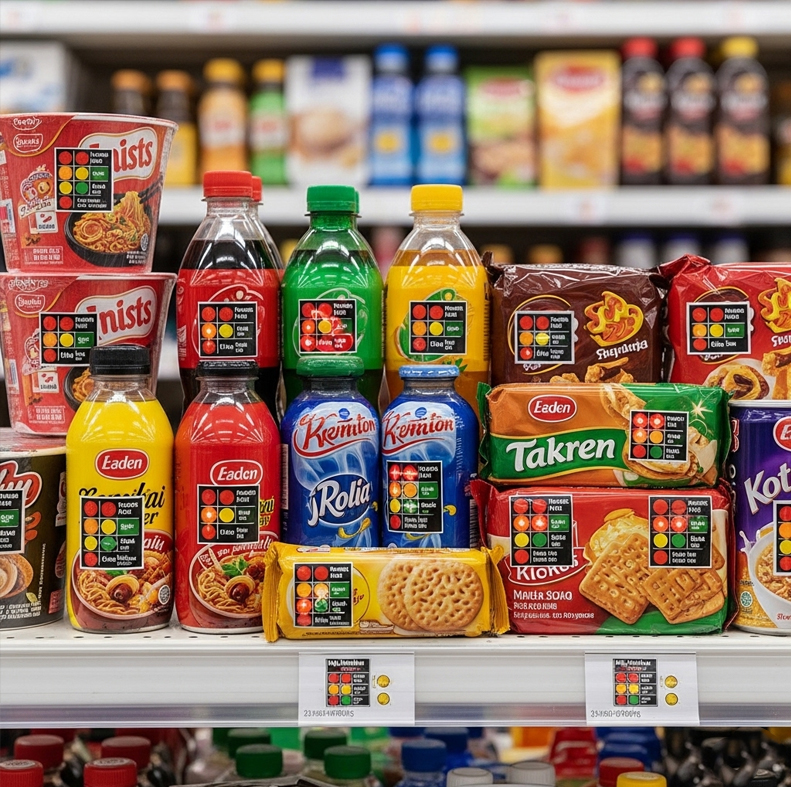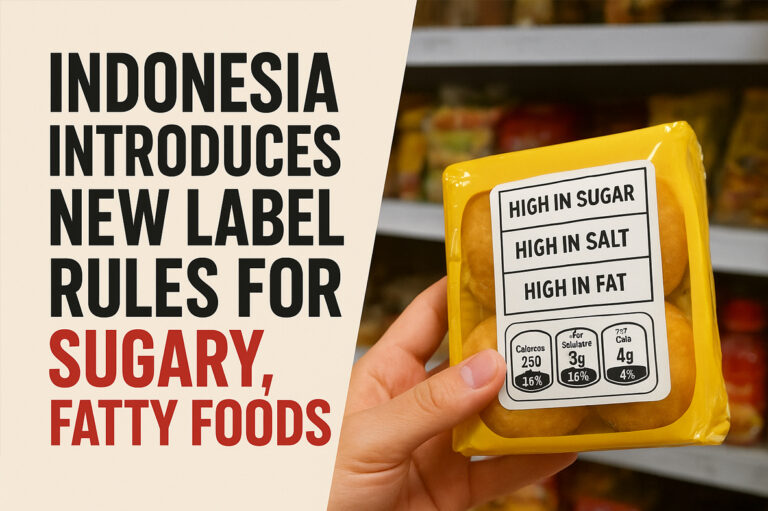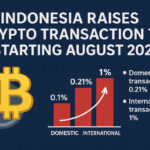Premium Biz Post – Indonesia has officially announced new regulations under the banner “Indonesia Introduces New Label Rules for Sugary, Fatty Foods,” aiming to address rising obesity rates and health concerns across the country. The government will require food and beverage companies to adopt stricter labeling for products with high sugar, salt, and fat content, giving them a two-year transition period to comply with the standards. The initiative is part of a broader public health strategy to encourage healthier dietary habits and raise consumer awareness.

Background: Rising Obesity and Health Challenges
Indonesia, Southeast Asia’s largest economy, has experienced rapid urbanization and lifestyle changes over the past two decades. With these changes has come a surge in non-communicable diseases, such as diabetes, hypertension, and obesity, often linked to diets high in sugar and processed foods. The Ministry of Health has repeatedly voiced concerns about the growing health risks, which strain public health resources and reduce productivity.
Data from the Indonesian Basic Health Research (Riskesdas) shows that obesity rates among adults doubled from 10.5% in 2007 to nearly 23% in 2023. The prevalence of childhood obesity is also alarming, with rates climbing steadily over the past five years. Experts attribute these numbers to the proliferation of processed foods, the rise of sugary drinks, and a lack of nutritional education.
By enforcing this labeling policy, the government hopes to reverse these trends and empower consumers to make informed food choices.
Details of the New Labeling Regulations
The regulation requires clear front-of-pack labeling for products with sugar, salt, or fat levels exceeding certain thresholds. Labels will include color-coded indicators and simplified nutritional information to help consumers quickly identify products that could pose health risks if consumed excessively.
The Ministry of Health has collaborated with the National Agency of Drug and Food Control (BPOM) to draft these guidelines. Companies will be required to display:
- Traffic Light Indicators: Red, yellow, or green color codes to show sugar, salt, and fat levels.
- Daily Value Percentages: Nutritional information expressed as a percentage of the recommended daily intake.
- Warning Statements: Products exceeding safe limits must carry clear warnings to discourage excessive consumption.
Businesses will have two years to adjust packaging and production processes. Authorities expect full compliance by the end of 2027, with strict penalties for violations.
Impact on Food and Beverage Industry
This policy is expected to bring significant changes to Indonesia’s food and beverage (F&B) industry, which is one of the fastest-growing sectors in the region. Manufacturers may face increased costs due to changes in packaging design, product reformulation, and marketing strategies. However, analysts believe this initiative could also open new opportunities.
Brands that adapt quickly may gain consumer trust by promoting healthier alternatives and transparent labeling. International companies are already familiar with similar policies in countries like Chile, Mexico, and the UK, where front-of-pack warning labels have influenced consumer purchasing decisions.
Large Indonesian brands, especially those in the snack and beverage markets, may need to innovate their products to reduce sugar and fat levels to avoid negative labeling. This trend could encourage competition and healthier product development across the sector.
Consumer Awareness and Public Education Campaigns
Government officials emphasize that regulations alone will not solve the problem. Public education is a crucial element of this initiative. Campaigns are being planned to raise awareness of healthy eating habits, encourage physical activity, and inform the public about interpreting nutritional labels.
The government is working with schools, community organizations, and media outlets to promote this health agenda. The goal is to make consumers more conscious of their dietary choices and reduce their reliance on highly processed, nutrient-poor foods.
International Comparisons
Indonesia joins a growing number of countries implementing stricter labeling laws to combat obesity. For example:
- Chile was one of the first countries to adopt warning labels on unhealthy food products, resulting in measurable reductions in sugary drink consumption.
- Mexico introduced black warning labels in 2020, significantly influencing purchasing decisions.
- The United Kingdom implemented the traffic light system, which has been praised for helping consumers make quick, informed decisions.
These success stories inspired Indonesian policymakers to create a localized approach tailored to domestic dietary habits. By referencing global best practices, the government aims to achieve similar health improvements.
Read More : ”Cardboard Magic Simple Cardboard Crafts”
The Role of Technology and Digitalization
To ensure effective enforcement, authorities are considering integrating QR codes on packaging. Consumers will be able to scan these codes for more detailed information about product ingredients, sourcing, and certifications. Digital health apps could also sync with this labeling initiative, allowing users to track their sugar and calorie intake.
E-commerce platforms may be required to display nutritional labels online, ensuring that consumers who shop digitally have the same level of information as those purchasing in stores. This move highlights Indonesia’s commitment to integrating digital technology into public health campaigns.
Reactions from Industry Stakeholders
The regulation has received mixed responses from industry players. Some manufacturers express concerns over costs and logistical challenges, especially small and medium-sized enterprises (SMEs). They argue that implementing the changes may take significant time and resources.
However, health advocates and nutrition experts welcome the policy as a necessary step to tackle the obesity epidemic. They stress that product reformulation and transparent marketing are key to improving the nation’s health profile.
Retail associations are also preparing for adjustments. Many supermarkets and convenience stores plan to redesign their product placement strategies to highlight healthier options, responding to shifting consumer preferences.
Opportunities for Innovation
The new labeling requirements could encourage innovation in Indonesia’s F&B sector. Manufacturers may focus on producing low-sugar, low-fat alternatives to meet growing health-conscious demand. Functional foods, plant-based products, and natural sweeteners are likely to see increased popularity.
Startups and local brands may also benefit by entering the market with health-focused products. With global consumer trends leaning toward wellness, Indonesia’s regulatory changes could help local businesses tap into a larger regional and international market.
Economic and Social Implications
Beyond health outcomes, this initiative has broader economic and social impacts. Reducing obesity and diet-related illnesses will ease the burden on Indonesia’s healthcare system, potentially saving billions in treatment costs. Healthier citizens are also likely to be more productive, contributing positively to economic growth.
Socially, the campaign may foster a shift in cultural attitudes toward food consumption. Indonesians traditionally enjoy fried foods and sweetened beverages, but younger generations are showing increased interest in wellness and fitness trends. The labeling system aligns with these evolving preferences.
Enforcement and Monitoring
The Ministry of Health, in partnership with BPOM, will establish a robust monitoring system to ensure compliance. Random inspections, fines, and product recalls may be enforced for non-compliance. Authorities are also seeking collaboration with consumer protection agencies to report violations.
Retailers and online marketplaces will play a key role in promoting the labeling initiative. By integrating regulations into the entire supply chain, the government hopes to make the policy effective and sustainable.
A Healthier Future for Indonesia
The launch of this policy under the banner “Indonesia Introduces New Label Rules for Sugary, Fatty Foods” marks a major milestone in public health reform. The government’s proactive stance demonstrates a commitment to addressing obesity and improving national well-being.
While the F&B industry faces challenges, this regulation also creates opportunities for innovation, healthier product offerings, and a stronger connection with consumers. If successfully implemented, Indonesia’s new labeling standards could become a model for other developing nations grappling with similar health issues.
As the two-year transition period begins, all eyes are on food and beverage companies to see how they adapt. For Indonesian consumers, this initiative represents a step toward a healthier future, where transparency, education, and informed choices drive better health outcomes.



